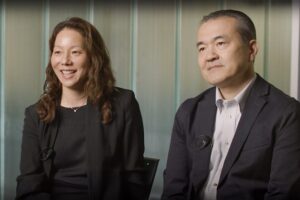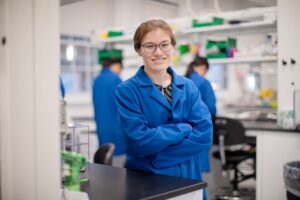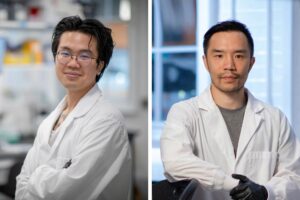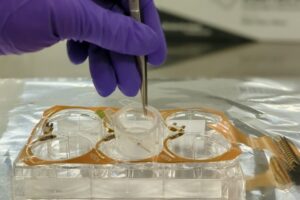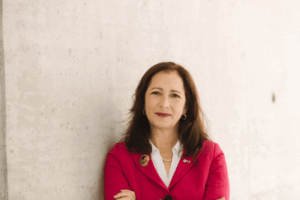Research News and Stories
Explore the latest news, stories, and groundbreaking research happening at the Institute of Biomedical Engineering. Stay updated on innovative projects, impactful discoveries, and the achievements of our talented students, faculty, and alumni shaping the future of biomedical science and engineering.
Quick Navigation
Professor Milica Radisic earns NSERC’s John C. Polanyi Award
Professor Milica Radisic (BME, ChemE) has received this year’s John C. Polanyi Award from the Natural Sciences and Engineering Research Council (NSERC).
Professor Leo Chou awarded $130,000 to advance cancer vaccine research
Professor Leo Chou has been awarded $130,000 in funding from The Cancer Research Society (CRS) to propel forward an ambitious project aiming to boost the effectiveness of cancer vaccines. This award places him among 100 distinguished Canadian recipients this year, each selected to push boundaries in cancer research with innovative solutions.
Researchers identify potential target to reduce cancer cell invasion through fibroblast regulation
Researchers from the Institute of Biomedical Engineering at the University of Toronto have identified a novel approach to potentially slow cancer progression by targeting a key enzyme that influences cancer-associated fibroblasts (CAFs).
Unlocking faster biodegradation of lipid nanoparticles
A recent study led by researchers at the University of Toronto sheds new light on a crucial challenge in the field of nucleic acid drug delivery: how to make lipid nanoparticles (LNPs) break down more quickly in the body. This discovery could pave the way for medicines that can be administered more frequently and with fewer side effects.
New imaging agent could improve early detection of inflammatory disease
Researchers from the Institute of Biomedical Engineering at the University of Toronto have developed a novel MRI contrast agent that may enhance the early detection of inflammatory diseases by targeting nitric oxide (NO), a key molecule involved in the body’s immune response.
This U of T Engineering professor is developing novel biomaterials to improve the treatment of chronic diseases
Maikawa is one of two U of T Engineering professors to receive funding from the latest round of the Canadian Foundation for Innovation John R. Evans Leaders Fund (CFI-JELF).
Researchers develop scalable DNA-based neural networks for molecular computing
Researchers at the University of Toronto have made an advancement in DNA-based neural networks, paving the way for more portable and scalable molecular computers. By implementing new strategies to overcome existing limitations, the team has developed neural networks that can process information quickly and accurately without relying on traditional electronic components.
New research has potential to speed up forensic analysis in sexual assault cases
Professor Aaron Wheeler and his team has developed a new technique for analyzing evidence in sexual assault cases. The new approach could streamline the forensics pipeline and reduce delays in the processing of DNA evidence.
New co-delivery method for efficient siRNA and small molecule drug transport
Researchers at the University of Toronto have developed a method for co-delivering therapeutic RNA and potent drugs directly into cells, potentially leading to a more effective treatment of diseases in the future. This research, recently published in Advanced Materials, explores how ionizable drugs can be used to co-formulate small interfering RNA (siRNA) for more effective intracellular delivery.
Three BME faculty members awarded Connaught New Researcher Fund
Professors Aereas Aung, Daniel Franklin, and Caitlin Maikawa were awarded the Connaught New Researcher Awards, which support early-career faculty members in establishing their research programs. They are among 8 researchers from the U of T Engineering who received support in the latest round.
‘The future is already here’: University of Toronto’s Milica Radisic on organ-on-a-chip technology
Listen to the podcast hosted by The Hub, where they chat with University of Toronto professor and Canadian Research Chair of organ-on-a-chip engineering Milica Radisic discussing her world-leading research on organ-on-a-chip technology.
Joint efforts propel transformative scientific discoveries
Professor Caitlin Maikawa, a Schmidt Science Fellow, was recently featured by Times Higher Education about her interdisciplinary research at the Institute of Biomedical Engineering.
Five BME faculty members & collaborators receive a combined $2.6mil+ funding from CIHR
Professors Hai-Ling Margaret Cheng, Leo Chou, Daniel Franklin, Naomi Matsuura, and Cari Whyne and their collaborators have received a combined funding of $2.6mil+ from the Canadian Institute of Health Research (CIHR) as a part of the 2024 Spring CIHR Project Grant. The CIHR Project Grant program funds innovative health research projects with the potential to significantly advance health knowledge, healthcare, health systems, and health outcomes.
New technique improves measurement of cell barriers
Researchers at the University of Toronto have developed a novel, cost-effective method called Porous Membrane Electrical Cell–Substrate Impedance Spectroscopy (PM-ECIS) to assess the function of biological barriers in Petri dishes. In a subsequent study, the researchers characterized its sensitivity and further validated the method against a gold-standard barrier assessment technique. This new method could enhance research in fields like drug development and disease modeling.
Immune cells pave the way for advanced Heart-on-a-Chip Technology
Researchers at the University of Toronto have made strides in heart disease research by incorporating primitive macrophages—a crucial immune cell—into heart-on-a-chip technology. This innovative approach promises to enhance the functionality and stability of engineered heart tissues, potentially transforming drug testing and disease modeling.
Professor Alison McGuigan awarded Senior Scientist Award at 7th TERMIS World Congress
Professor Alison McGuigan has been honored with the prestigious Tissue Engineering and Regenerative Medicine International Society Americas Chapters (TERMIS-AM) Senior Scientist Award. This esteemed award was presented to Professor McGuigan on the final day of the 7th TERMIS World Congress Conference, held from June 25-28 in Seattle, Washington. The Senior Scientist Award is conferred upon individuals who have made significant contributions to the fields of tissue engineering and regenerative medicine.
Molly Shoichet named inaugural Pamela and Paul Austin Chair in Precision and Regenerative Medicine
University Professor Molly Shoichet (ChemE, BME) has been named the inaugural Pamela and Paul Austin Chair in Precision and Regenerative Medicine. The chair, situated within the Department of Chemical Engineering & Applied Chemistry, was created in November 2023 via a gift from the The P. Austin Family Foundation.
Functional Electrical Stimulation sleeve to improve rehabilitation for motor control impairments
A recent study published in BioMedical Engineering OnLine introduces a novel smart sleeve designed for Functional Electrical Stimulation (FES) applications. This new technology integrates advanced carbon-based dry electrodes within a textile structure, offering significant improvements in comfort and usability for patients with motor control impairments.
Miniaturized assay promises faster discovery of stem cell therapies
Researchers at the University of Toronto have developed a new miniaturized assay platform, mini-MEndR, designed to evaluate muscle stem cell-mediated repair in a more efficient and scalable manner. This novel platform, funded by CFREF “Medicine by Design”, represents a significant advancement in the field of regenerative medicine, offering the potential to accelerate the discovery of therapeutic targets for muscle repair and regeneration.
New imaging technique to improve the study of heart valve disease in mice
Researchers from the Institute of Biomedical Engineering (BME) at the University of Toronto and the Translational Biology and Engineering Program in the Ted Rogers Centre for Heart Research have developed an ultrasound imaging protocol that promises to transform how congenital heart valve diseases are studied in mice. This new technique allows scientists to identify structural abnormalities in the aortic valve of juvenile mice as young as four weeks old, paving the way for more efficient, cost-effective, and humane research practices.


